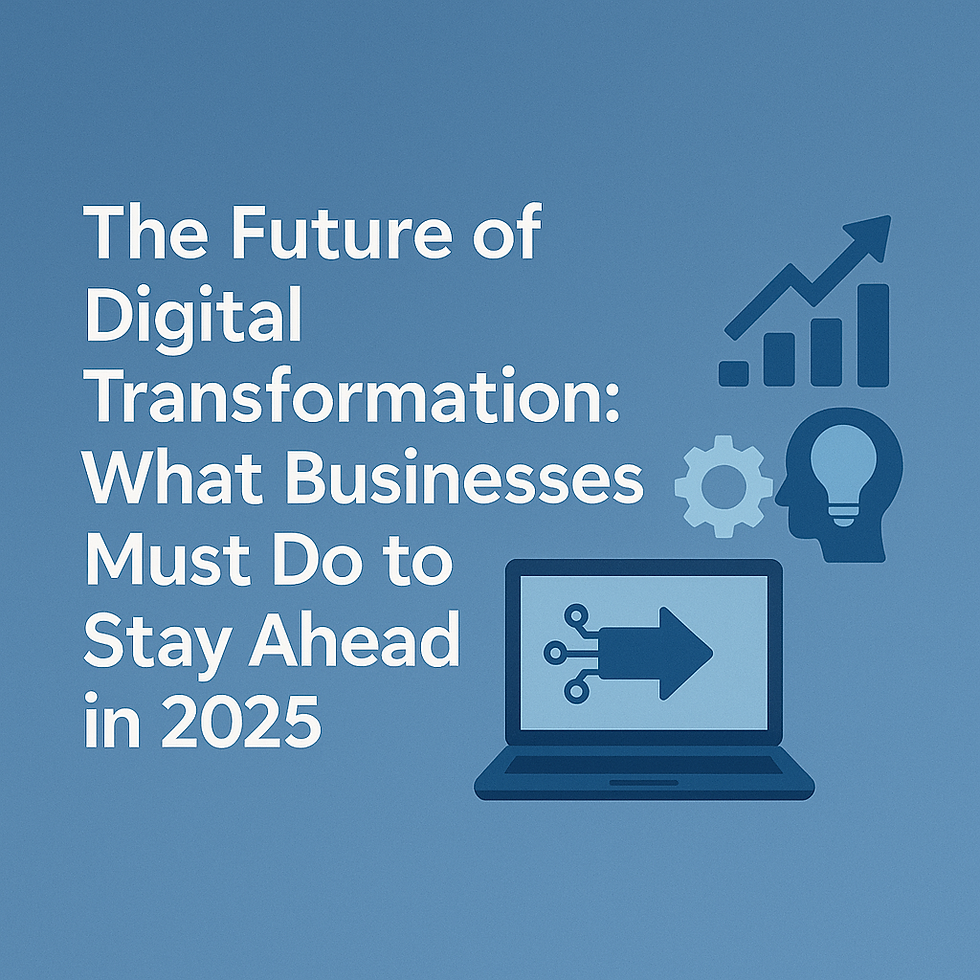The Future of Digital Transformation: What Businesses Must Do to Stay Ahead in 2025
- Ononkwa Egan
- Sep 8, 2025
- 2 min read


Digital transformation continues to accelerate, reshaping how businesses operate, deliver value, and engage customers. As we advance into 2025, the pace of technological innovation combined with evolving customer expectations demands that companies proactively adapt to remain competitive. Businesses that fail to embrace the next wave of digital change risk falling behind, while those that align their strategies with emerging trends can unlock new growth opportunities and resilience.
Embracing Emerging Technologies
The future of digital transformation hinges on the adoption of cutting-edge technologies that enhance automation, intelligence, and connectivity. Key technologies to watch include:
Artificial Intelligence (AI) and Machine Learning: From customer service chatbots to predictive analytics, AI is enabling smarter decision-making and personalized experiences. Businesses must integrate AI across operations to optimize efficiency and innovation.
Edge Computing: By processing data closer to its source, edge computing reduces latency and improves real-time responsiveness—crucial for sectors like manufacturing, healthcare, and autonomous vehicles.
5G Connectivity: The broader rollout of 5G networks will enable faster data transmission and richer applications like augmented and virtual reality, driving new engagement models.
Blockchain and Decentralized Technologies: Enhanced security, transparency, and trust are becoming imperative, pushing blockchain adoption beyond cryptocurrencies into supply chain management, identity verification, and more.
Prioritizing Customer-Centric Digital Experiences
In 2025, the battlefield for business success will be defined by customer experience. Customers expect seamless, personalized interactions across all channels. To meet these demands:
Businesses must leverage data analytics to gain deeper insights into customer behavior and preferences.
Omnichannel strategies that unify online and offline touchpoints will become standard.
Tailored content, AI-driven recommendations, and frictionless payment options will shape the end-to-end experience.
Privacy and data protection must be fundamental, as consumers become more aware of how their data is used.
Agile and Resilient Organizational Models
Digital transformation is not just about technology but also about culture and structure. Companies that want to thrive must:
Adopt agile methodologies that allow rapid adaptation to market shifts.
Foster a culture of continuous learning and innovation to keep up with technological advancements.
Invest in workforce reskilling, focusing on digital literacy, data analytics, and AI capabilities.
Structure teams to enable cross-functional collaboration, breaking down silos.
Ethical and Sustainable Practices
Sustainability and ethics are rising priorities in digital initiatives. Businesses must ensure their digital transformations:
Align with environmental goals by optimizing energy consumption and reducing waste.
Use AI and automation responsibly to mitigate bias and uphold fairness.
Respect user privacy and comply with growing regulations globally.
Promote inclusivity by designing accessible products and services.
Innovating Through Ecosystems and Partnerships
No company can digitally transform alone. In 2025, the emphasis will be on building and participating in ecosystems where partners share resources, data, and expertise. Collaborations with startups, technology vendors, and even competitors will spur innovation and speed to market.
Conclusion
The future of digital transformation in 2025 is marked by rapid technology adoption, customer-centric approaches, agile organizations, ethical responsibility, and collaborative ecosystems. For businesses aiming to stay ahead, the path involves integrating emerging technologies thoughtfully, prioritizing customer experience, cultivating adaptive cultures, and committing to sustainability and ethics. Those who navigate these priorities successfully will position themselves to thrive amid continual change and disruption.



Comments